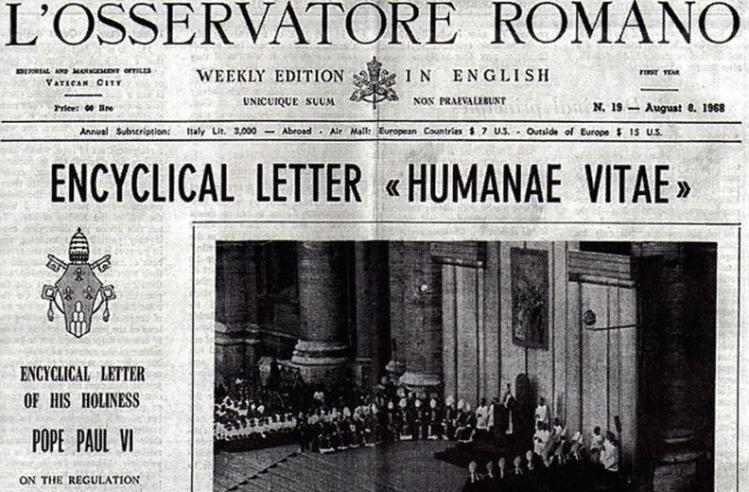
Millions of words have been written in response to Humanae vitae, Pope Paul VI’s much contested 1968 encyclical reasserting the church’s teaching on the immorality of contraception. Commonweal has published more than its fair share of such commentary, most of it questioning the encyclical’s reasoning and wisdom while welcoming the pope’s inspiring vision of the beauty and meaning of marriage. July marks the fiftieth anniversary of the encyclical’s promulgation, and those on both sides of the question are dutifully revisiting the debate. On such an exhaustively vetted dispute, it is doubtful that any new understandings or common ground will be established. A review of the trajectory of the argument might prove useful, however, especially for readers who may have had little exposure to this history. To that end, Commonweal has plundered its archives in search of the most piquant examples of the initial and subsequent reactions to a papal decision that is acknowledged, by those on all sides of the conflict, to be one of the church’s most damaging ongoing crises.
During the Second Vatican Council Pope John XXIII set up a commission to study questions raised by the widespread use of the birth control pill and alarms about overpopulation. Pope Paul removed the question from the council’s agenda, but allowed the commission’s work to proceed. In June 1966 a large majority of the commission, including bishops and theologians, recommended that the church relax its prohibitions and allow married couples to conscientiously choose the best means to achieve “responsible parenthood.” Millions of Catholics expected that the pope would abide by that recommendation. Instead, after waiting two years, Paul VI followed a minority-report warning that for the church to admit it had erred in the past would fatally undermine its authority and credibility. Even before Humanae vitae was released, Commonweal’s editors made what was at stake emphatically clear. “We want, finally, a conception of the relationship between faith and reason which does justice to the high place of reason in the Catholic tradition.... It was un-reason, on the contrary, which led the conservative minority to uphold a position which even they admitted could not be supported by rational arguments. This kind of irrationality must come to an end in the church.”
In 2015, Peter Steinfels echoed this concern. Why was Pope Francis’s Synod on the Family unwilling to revisit Humanae vitae, the elephant in the room when it comes to the impact of the church’s teachings on sexual morality and Catholic family life? Defenders of the encyclical have championed it in terms of a host of other issues—from its warnings about the sexual revolution and the dangers of technological, neocolonial, or selfishly “contraceptive” mentalities to the spiritual and marital superiority of Natural Family Planning. But this avoids Humanae vitae’s central moral insistence—namely, that each and every act of marital intercourse must be open to procreation, regardless of consequences; anything else is intrinsically evil and gravely sinful. Noting that Catholics who follow the church’s teaching and practice NFP also intend to avoid procreation, at least at certain times, the conservative Catholic philosopher Michael Dummett finds the encyclical’s teaching indefensible. The church’s recognition that the use of the “natural” or rhythm method was morally legitimate, Dummett wrote, “denied it the right to hold the purpose of reducing the frequency or number of pregnancies to be in itself wrong.”
How much damage has been done? Commonweal’s July 15, 1988, editorial, “Anniversary Waltz,” lamented how Humanae vitae “hobbled the church for the cultural struggle at hand,” especially the challenges presented by the legalization of abortion. Unable to embrace the church’s teaching on birth control, many priests, religious, and Catholic parents retreated from answering questions about the church’s teachings on sexual morality, both inside and outside the family. “The failure to develop a fuller understanding of marriage and sexual morality has been especially detrimental to young Catholics,” the editors wrote. Where once Catholics thought carefully—indeed agonized—about sexual decision-making in ways that shaped the most important relationships in their lives, many younger Catholics, deprived of guidance from adults, found themselves adrift in the popular culture’s celebration of casual sex.
Historian Leslie Tentler confirmed this appraisal. “Silence on contraception inevitably led to an even greater silence—this one around sexual morality generally. At a time of almost breathtaking change in sexual values and behavior, church leaders had little to offer beyond what theologian Gerard Sloyan has called ‘prohibitions without explanations.’” The consequences have been dire, if predictable. In the fifty years since Pope Paul attempted to shore up the church’s authority by the assertion of authority alone, church membership and Mass attendance have plummeted, especially among the young. As Tentler writes, “No religious leadership can afford to be seen by large numbers of its putative flock as irrelevant to their most immediate moral dilemmas.”
There is an expectation in some quarters that Pope Francis might yet call on the bishops to revisit Humanae vitae. Doubtless in the current polarized atmosphere within the church, where a vocal minority of conservative Catholics contrive to see Francis as a threat to “orthodoxy,” that would be a risky thing to do. But as Commonweal’s editors wrote in 1967, “What matters is choosing that course which best serves the Christian and human good, not that course which promises to enhance or diminish the church’s image, position in the world, or psychological attraction.”

